Entrepreneurial Ventures: Types, Impact, Traits, and Background
VerifiedAdded on 2023/01/12
|9
|2667
|59
AI Summary
This article discusses the various types of entrepreneurial ventures, including small and start-up businesses, and their impact on the economy. It also explores the characteristics and skills of successful entrepreneurs that differentiate them from other business managers. Additionally, it examines the role of background and experience in hindering or fostering business owners. Examples of entrepreneurs such as Steve Jobs and Sergey Brin are provided to illustrate these concepts.
Contribute Materials
Your contribution can guide someone’s learning journey. Share your
documents today.

Entrepreneurial
Ventures
Ventures
Secure Best Marks with AI Grader
Need help grading? Try our AI Grader for instant feedback on your assignments.
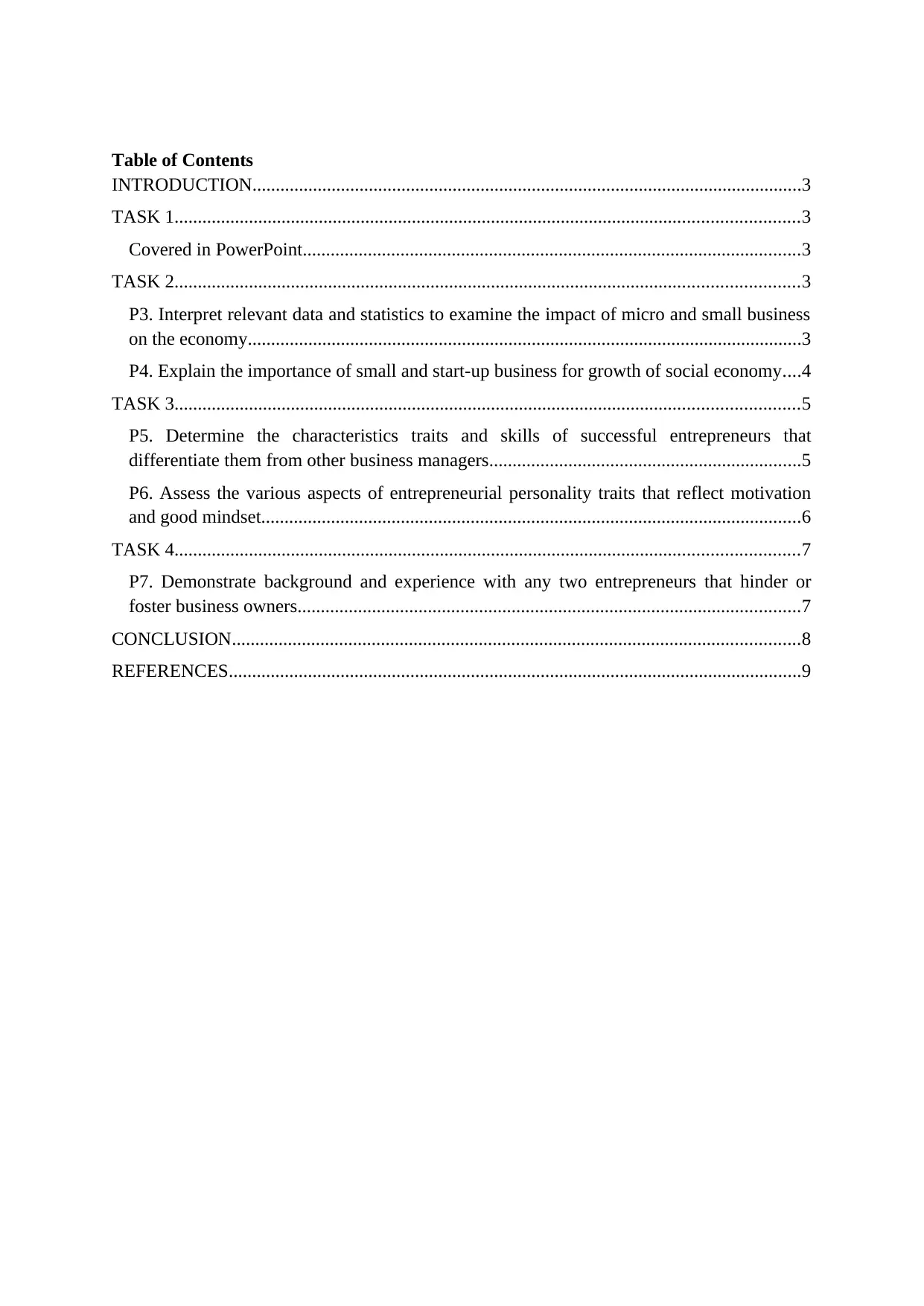
Table of Contents
INTRODUCTION......................................................................................................................3
TASK 1......................................................................................................................................3
Covered in PowerPoint...........................................................................................................3
TASK 2......................................................................................................................................3
P3. Interpret relevant data and statistics to examine the impact of micro and small business
on the economy.......................................................................................................................3
P4. Explain the importance of small and start-up business for growth of social economy....4
TASK 3......................................................................................................................................5
P5. Determine the characteristics traits and skills of successful entrepreneurs that
differentiate them from other business managers...................................................................5
P6. Assess the various aspects of entrepreneurial personality traits that reflect motivation
and good mindset....................................................................................................................6
TASK 4......................................................................................................................................7
P7. Demonstrate background and experience with any two entrepreneurs that hinder or
foster business owners............................................................................................................7
CONCLUSION..........................................................................................................................8
REFERENCES...........................................................................................................................9
INTRODUCTION......................................................................................................................3
TASK 1......................................................................................................................................3
Covered in PowerPoint...........................................................................................................3
TASK 2......................................................................................................................................3
P3. Interpret relevant data and statistics to examine the impact of micro and small business
on the economy.......................................................................................................................3
P4. Explain the importance of small and start-up business for growth of social economy....4
TASK 3......................................................................................................................................5
P5. Determine the characteristics traits and skills of successful entrepreneurs that
differentiate them from other business managers...................................................................5
P6. Assess the various aspects of entrepreneurial personality traits that reflect motivation
and good mindset....................................................................................................................6
TASK 4......................................................................................................................................7
P7. Demonstrate background and experience with any two entrepreneurs that hinder or
foster business owners............................................................................................................7
CONCLUSION..........................................................................................................................8
REFERENCES...........................................................................................................................9
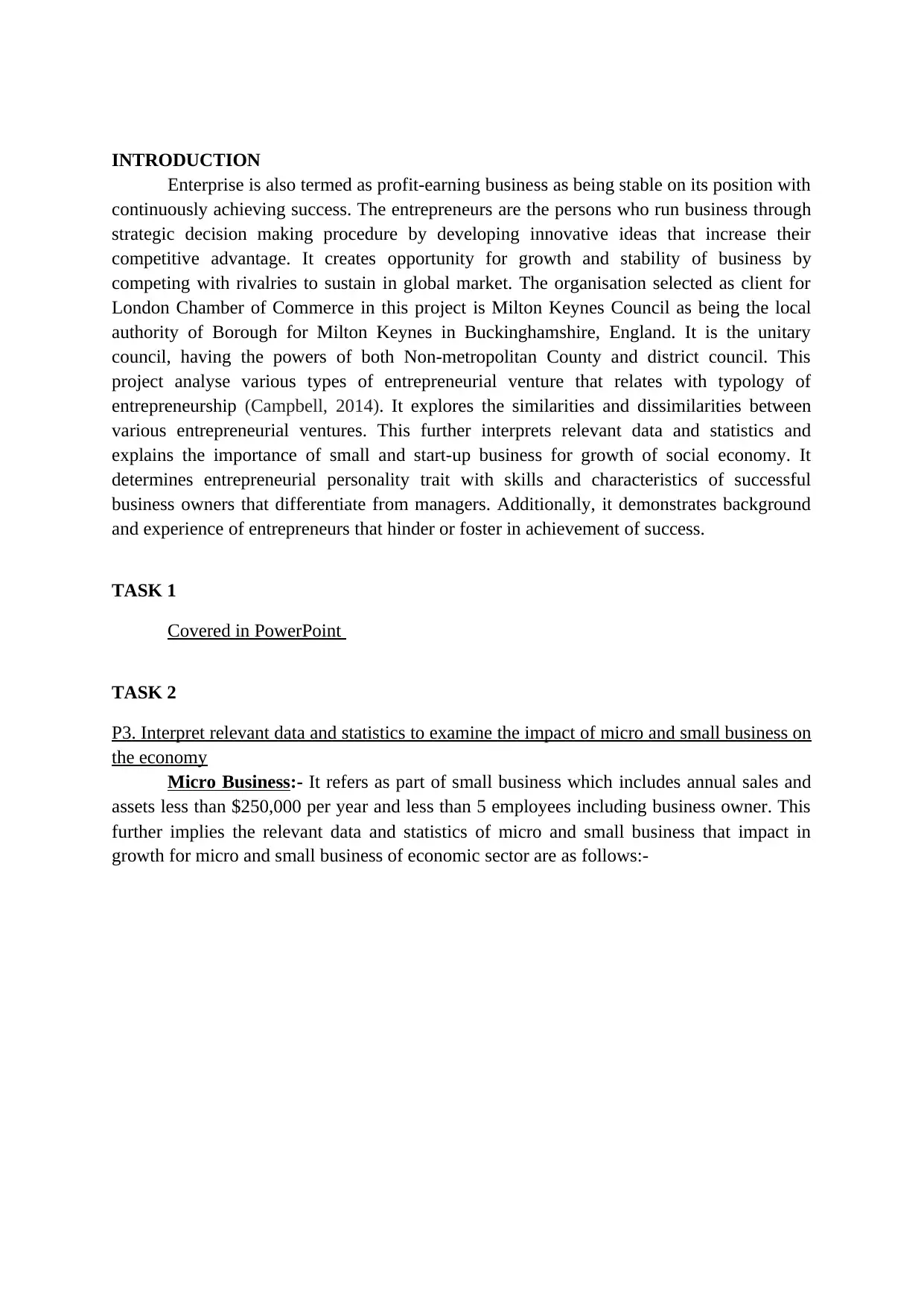
INTRODUCTION
Enterprise is also termed as profit-earning business as being stable on its position with
continuously achieving success. The entrepreneurs are the persons who run business through
strategic decision making procedure by developing innovative ideas that increase their
competitive advantage. It creates opportunity for growth and stability of business by
competing with rivalries to sustain in global market. The organisation selected as client for
London Chamber of Commerce in this project is Milton Keynes Council as being the local
authority of Borough for Milton Keynes in Buckinghamshire, England. It is the unitary
council, having the powers of both Non-metropolitan County and district council. This
project analyse various types of entrepreneurial venture that relates with typology of
entrepreneurship (Campbell, 2014). It explores the similarities and dissimilarities between
various entrepreneurial ventures. This further interprets relevant data and statistics and
explains the importance of small and start-up business for growth of social economy. It
determines entrepreneurial personality trait with skills and characteristics of successful
business owners that differentiate from managers. Additionally, it demonstrates background
and experience of entrepreneurs that hinder or foster in achievement of success.
TASK 1
Covered in PowerPoint
TASK 2
P3. Interpret relevant data and statistics to examine the impact of micro and small business on
the economy
Micro Business:- It refers as part of small business which includes annual sales and
assets less than $250,000 per year and less than 5 employees including business owner. This
further implies the relevant data and statistics of micro and small business that impact in
growth for micro and small business of economic sector are as follows:-
Enterprise is also termed as profit-earning business as being stable on its position with
continuously achieving success. The entrepreneurs are the persons who run business through
strategic decision making procedure by developing innovative ideas that increase their
competitive advantage. It creates opportunity for growth and stability of business by
competing with rivalries to sustain in global market. The organisation selected as client for
London Chamber of Commerce in this project is Milton Keynes Council as being the local
authority of Borough for Milton Keynes in Buckinghamshire, England. It is the unitary
council, having the powers of both Non-metropolitan County and district council. This
project analyse various types of entrepreneurial venture that relates with typology of
entrepreneurship (Campbell, 2014). It explores the similarities and dissimilarities between
various entrepreneurial ventures. This further interprets relevant data and statistics and
explains the importance of small and start-up business for growth of social economy. It
determines entrepreneurial personality trait with skills and characteristics of successful
business owners that differentiate from managers. Additionally, it demonstrates background
and experience of entrepreneurs that hinder or foster in achievement of success.
TASK 1
Covered in PowerPoint
TASK 2
P3. Interpret relevant data and statistics to examine the impact of micro and small business on
the economy
Micro Business:- It refers as part of small business which includes annual sales and
assets less than $250,000 per year and less than 5 employees including business owner. This
further implies the relevant data and statistics of micro and small business that impact in
growth for micro and small business of economic sector are as follows:-
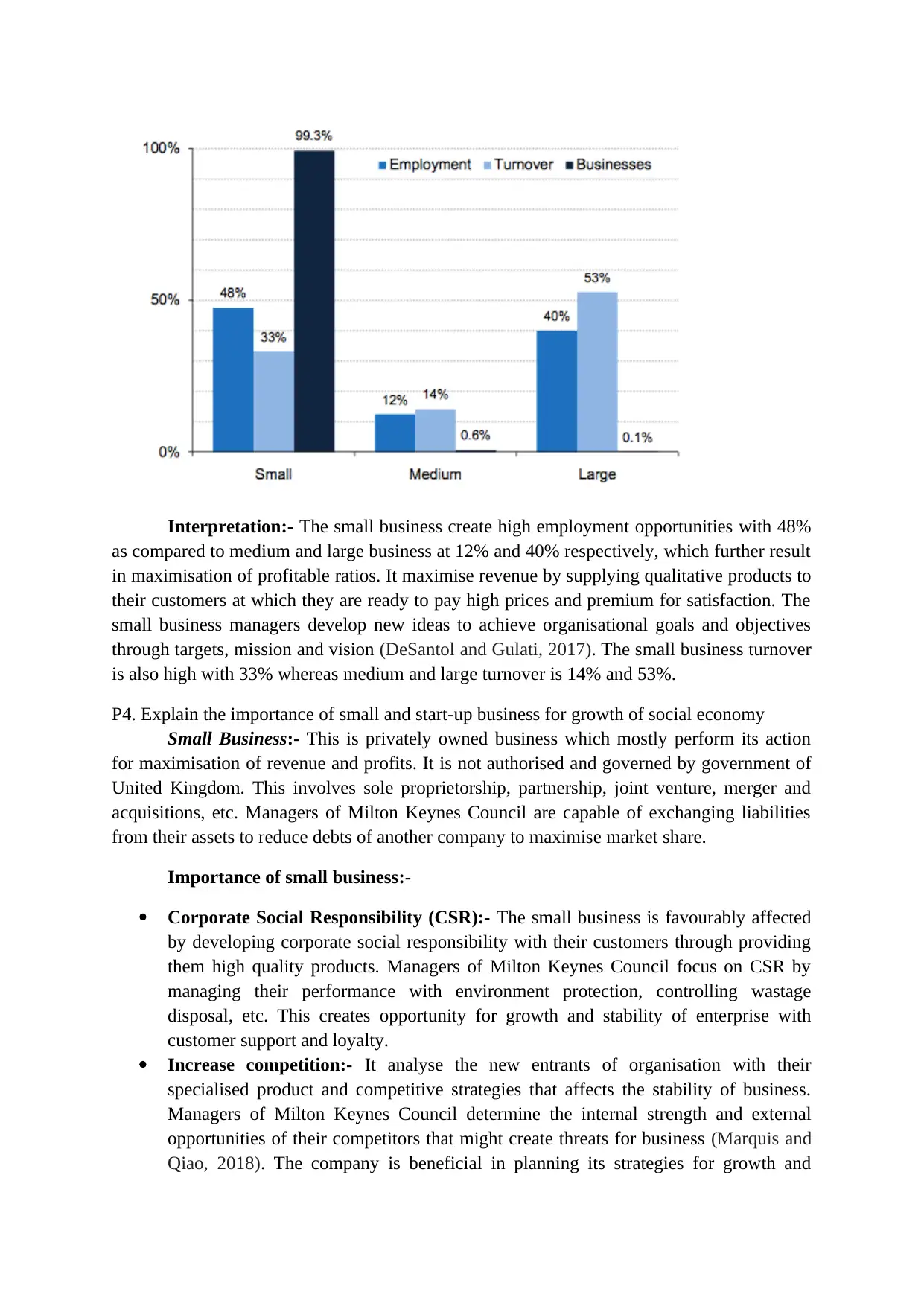
Interpretation:- The small business create high employment opportunities with 48%
as compared to medium and large business at 12% and 40% respectively, which further result
in maximisation of profitable ratios. It maximise revenue by supplying qualitative products to
their customers at which they are ready to pay high prices and premium for satisfaction. The
small business managers develop new ideas to achieve organisational goals and objectives
through targets, mission and vision (DeSantol and Gulati, 2017). The small business turnover
is also high with 33% whereas medium and large turnover is 14% and 53%.
P4. Explain the importance of small and start-up business for growth of social economy
Small Business:- This is privately owned business which mostly perform its action
for maximisation of revenue and profits. It is not authorised and governed by government of
United Kingdom. This involves sole proprietorship, partnership, joint venture, merger and
acquisitions, etc. Managers of Milton Keynes Council are capable of exchanging liabilities
from their assets to reduce debts of another company to maximise market share.
Importance of small business:-
Corporate Social Responsibility (CSR):- The small business is favourably affected
by developing corporate social responsibility with their customers through providing
them high quality products. Managers of Milton Keynes Council focus on CSR by
managing their performance with environment protection, controlling wastage
disposal, etc. This creates opportunity for growth and stability of enterprise with
customer support and loyalty.
Increase competition:- It analyse the new entrants of organisation with their
specialised product and competitive strategies that affects the stability of business.
Managers of Milton Keynes Council determine the internal strength and external
opportunities of their competitors that might create threats for business (Marquis and
Qiao, 2018). The company is beneficial in planning its strategies for growth and
as compared to medium and large business at 12% and 40% respectively, which further result
in maximisation of profitable ratios. It maximise revenue by supplying qualitative products to
their customers at which they are ready to pay high prices and premium for satisfaction. The
small business managers develop new ideas to achieve organisational goals and objectives
through targets, mission and vision (DeSantol and Gulati, 2017). The small business turnover
is also high with 33% whereas medium and large turnover is 14% and 53%.
P4. Explain the importance of small and start-up business for growth of social economy
Small Business:- This is privately owned business which mostly perform its action
for maximisation of revenue and profits. It is not authorised and governed by government of
United Kingdom. This involves sole proprietorship, partnership, joint venture, merger and
acquisitions, etc. Managers of Milton Keynes Council are capable of exchanging liabilities
from their assets to reduce debts of another company to maximise market share.
Importance of small business:-
Corporate Social Responsibility (CSR):- The small business is favourably affected
by developing corporate social responsibility with their customers through providing
them high quality products. Managers of Milton Keynes Council focus on CSR by
managing their performance with environment protection, controlling wastage
disposal, etc. This creates opportunity for growth and stability of enterprise with
customer support and loyalty.
Increase competition:- It analyse the new entrants of organisation with their
specialised product and competitive strategies that affects the stability of business.
Managers of Milton Keynes Council determine the internal strength and external
opportunities of their competitors that might create threats for business (Marquis and
Qiao, 2018). The company is beneficial in planning its strategies for growth and
Secure Best Marks with AI Grader
Need help grading? Try our AI Grader for instant feedback on your assignments.
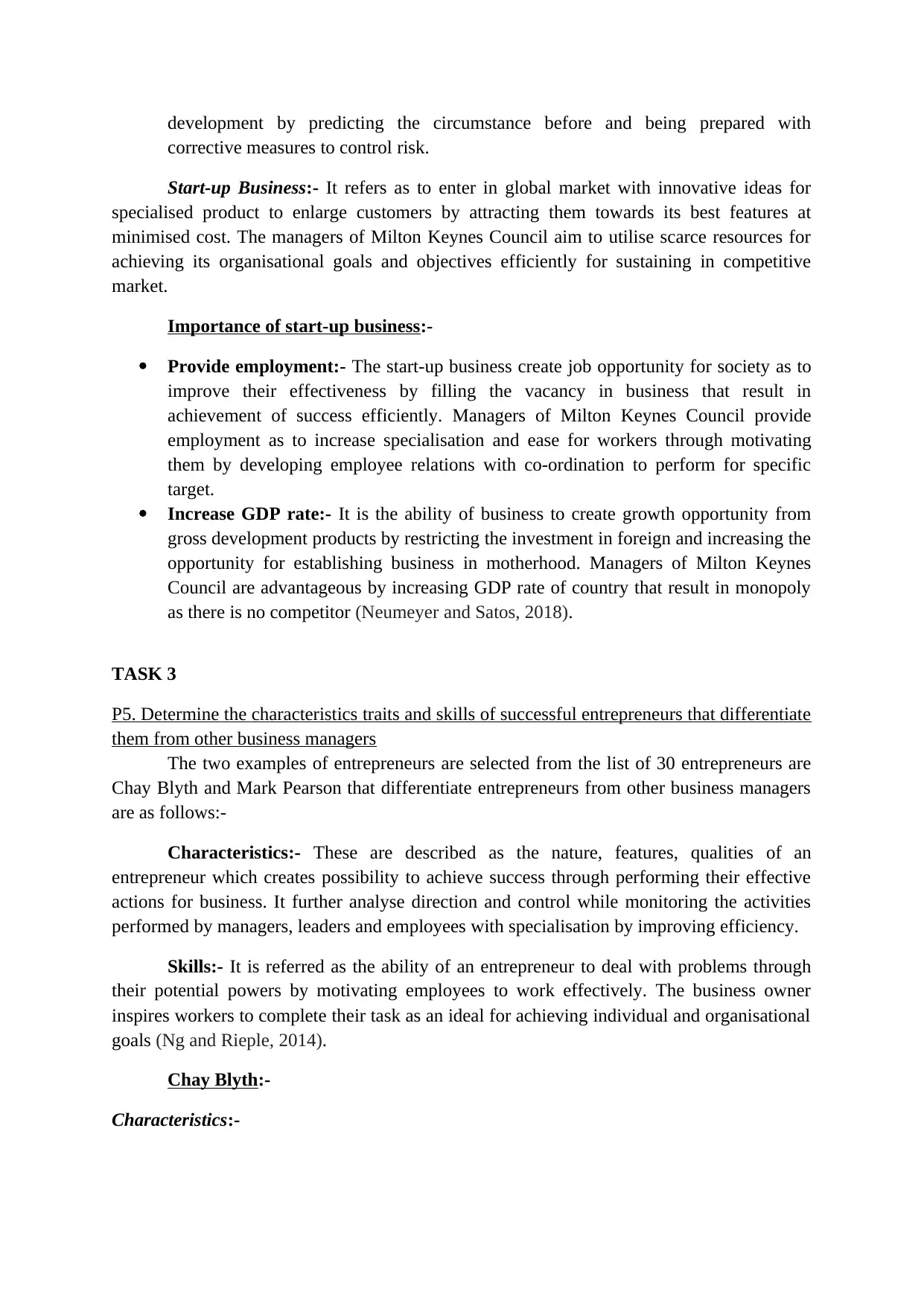
development by predicting the circumstance before and being prepared with
corrective measures to control risk.
Start-up Business:- It refers as to enter in global market with innovative ideas for
specialised product to enlarge customers by attracting them towards its best features at
minimised cost. The managers of Milton Keynes Council aim to utilise scarce resources for
achieving its organisational goals and objectives efficiently for sustaining in competitive
market.
Importance of start-up business:-
Provide employment:- The start-up business create job opportunity for society as to
improve their effectiveness by filling the vacancy in business that result in
achievement of success efficiently. Managers of Milton Keynes Council provide
employment as to increase specialisation and ease for workers through motivating
them by developing employee relations with co-ordination to perform for specific
target.
Increase GDP rate:- It is the ability of business to create growth opportunity from
gross development products by restricting the investment in foreign and increasing the
opportunity for establishing business in motherhood. Managers of Milton Keynes
Council are advantageous by increasing GDP rate of country that result in monopoly
as there is no competitor (Neumeyer and Satos, 2018).
TASK 3
P5. Determine the characteristics traits and skills of successful entrepreneurs that differentiate
them from other business managers
The two examples of entrepreneurs are selected from the list of 30 entrepreneurs are
Chay Blyth and Mark Pearson that differentiate entrepreneurs from other business managers
are as follows:-
Characteristics:- These are described as the nature, features, qualities of an
entrepreneur which creates possibility to achieve success through performing their effective
actions for business. It further analyse direction and control while monitoring the activities
performed by managers, leaders and employees with specialisation by improving efficiency.
Skills:- It is referred as the ability of an entrepreneur to deal with problems through
their potential powers by motivating employees to work effectively. The business owner
inspires workers to complete their task as an ideal for achieving individual and organisational
goals (Ng and Rieple, 2014).
Chay Blyth:-
Characteristics:-
corrective measures to control risk.
Start-up Business:- It refers as to enter in global market with innovative ideas for
specialised product to enlarge customers by attracting them towards its best features at
minimised cost. The managers of Milton Keynes Council aim to utilise scarce resources for
achieving its organisational goals and objectives efficiently for sustaining in competitive
market.
Importance of start-up business:-
Provide employment:- The start-up business create job opportunity for society as to
improve their effectiveness by filling the vacancy in business that result in
achievement of success efficiently. Managers of Milton Keynes Council provide
employment as to increase specialisation and ease for workers through motivating
them by developing employee relations with co-ordination to perform for specific
target.
Increase GDP rate:- It is the ability of business to create growth opportunity from
gross development products by restricting the investment in foreign and increasing the
opportunity for establishing business in motherhood. Managers of Milton Keynes
Council are advantageous by increasing GDP rate of country that result in monopoly
as there is no competitor (Neumeyer and Satos, 2018).
TASK 3
P5. Determine the characteristics traits and skills of successful entrepreneurs that differentiate
them from other business managers
The two examples of entrepreneurs are selected from the list of 30 entrepreneurs are
Chay Blyth and Mark Pearson that differentiate entrepreneurs from other business managers
are as follows:-
Characteristics:- These are described as the nature, features, qualities of an
entrepreneur which creates possibility to achieve success through performing their effective
actions for business. It further analyse direction and control while monitoring the activities
performed by managers, leaders and employees with specialisation by improving efficiency.
Skills:- It is referred as the ability of an entrepreneur to deal with problems through
their potential powers by motivating employees to work effectively. The business owner
inspires workers to complete their task as an ideal for achieving individual and organisational
goals (Ng and Rieple, 2014).
Chay Blyth:-
Characteristics:-
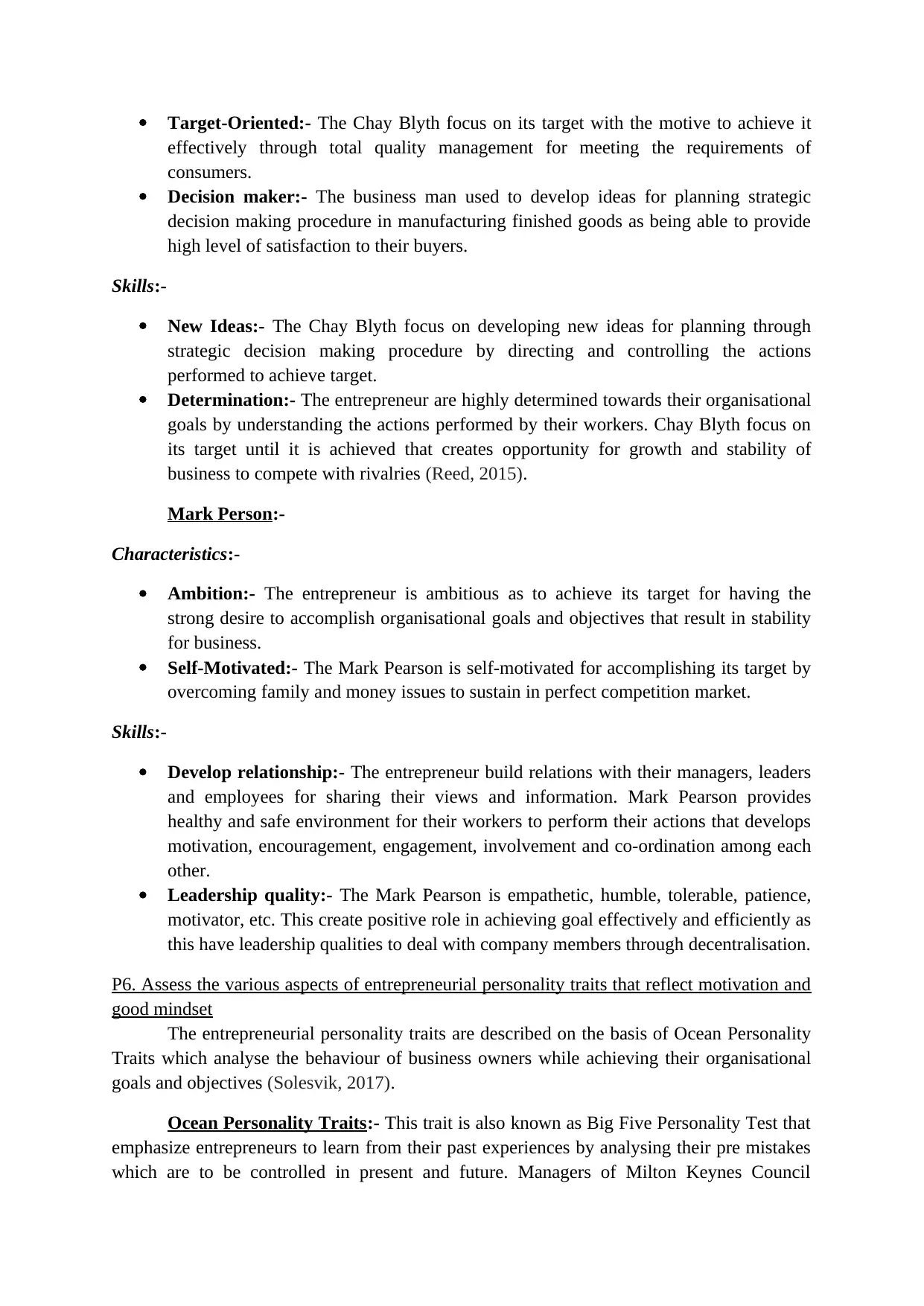
Target-Oriented:- The Chay Blyth focus on its target with the motive to achieve it
effectively through total quality management for meeting the requirements of
consumers.
Decision maker:- The business man used to develop ideas for planning strategic
decision making procedure in manufacturing finished goods as being able to provide
high level of satisfaction to their buyers.
Skills:-
New Ideas:- The Chay Blyth focus on developing new ideas for planning through
strategic decision making procedure by directing and controlling the actions
performed to achieve target.
Determination:- The entrepreneur are highly determined towards their organisational
goals by understanding the actions performed by their workers. Chay Blyth focus on
its target until it is achieved that creates opportunity for growth and stability of
business to compete with rivalries (Reed, 2015).
Mark Person:-
Characteristics:-
Ambition:- The entrepreneur is ambitious as to achieve its target for having the
strong desire to accomplish organisational goals and objectives that result in stability
for business.
Self-Motivated:- The Mark Pearson is self-motivated for accomplishing its target by
overcoming family and money issues to sustain in perfect competition market.
Skills:-
Develop relationship:- The entrepreneur build relations with their managers, leaders
and employees for sharing their views and information. Mark Pearson provides
healthy and safe environment for their workers to perform their actions that develops
motivation, encouragement, engagement, involvement and co-ordination among each
other.
Leadership quality:- The Mark Pearson is empathetic, humble, tolerable, patience,
motivator, etc. This create positive role in achieving goal effectively and efficiently as
this have leadership qualities to deal with company members through decentralisation.
P6. Assess the various aspects of entrepreneurial personality traits that reflect motivation and
good mindset
The entrepreneurial personality traits are described on the basis of Ocean Personality
Traits which analyse the behaviour of business owners while achieving their organisational
goals and objectives (Solesvik, 2017).
Ocean Personality Traits:- This trait is also known as Big Five Personality Test that
emphasize entrepreneurs to learn from their past experiences by analysing their pre mistakes
which are to be controlled in present and future. Managers of Milton Keynes Council
effectively through total quality management for meeting the requirements of
consumers.
Decision maker:- The business man used to develop ideas for planning strategic
decision making procedure in manufacturing finished goods as being able to provide
high level of satisfaction to their buyers.
Skills:-
New Ideas:- The Chay Blyth focus on developing new ideas for planning through
strategic decision making procedure by directing and controlling the actions
performed to achieve target.
Determination:- The entrepreneur are highly determined towards their organisational
goals by understanding the actions performed by their workers. Chay Blyth focus on
its target until it is achieved that creates opportunity for growth and stability of
business to compete with rivalries (Reed, 2015).
Mark Person:-
Characteristics:-
Ambition:- The entrepreneur is ambitious as to achieve its target for having the
strong desire to accomplish organisational goals and objectives that result in stability
for business.
Self-Motivated:- The Mark Pearson is self-motivated for accomplishing its target by
overcoming family and money issues to sustain in perfect competition market.
Skills:-
Develop relationship:- The entrepreneur build relations with their managers, leaders
and employees for sharing their views and information. Mark Pearson provides
healthy and safe environment for their workers to perform their actions that develops
motivation, encouragement, engagement, involvement and co-ordination among each
other.
Leadership quality:- The Mark Pearson is empathetic, humble, tolerable, patience,
motivator, etc. This create positive role in achieving goal effectively and efficiently as
this have leadership qualities to deal with company members through decentralisation.
P6. Assess the various aspects of entrepreneurial personality traits that reflect motivation and
good mindset
The entrepreneurial personality traits are described on the basis of Ocean Personality
Traits which analyse the behaviour of business owners while achieving their organisational
goals and objectives (Solesvik, 2017).
Ocean Personality Traits:- This trait is also known as Big Five Personality Test that
emphasize entrepreneurs to learn from their past experiences by analysing their pre mistakes
which are to be controlled in present and future. Managers of Milton Keynes Council
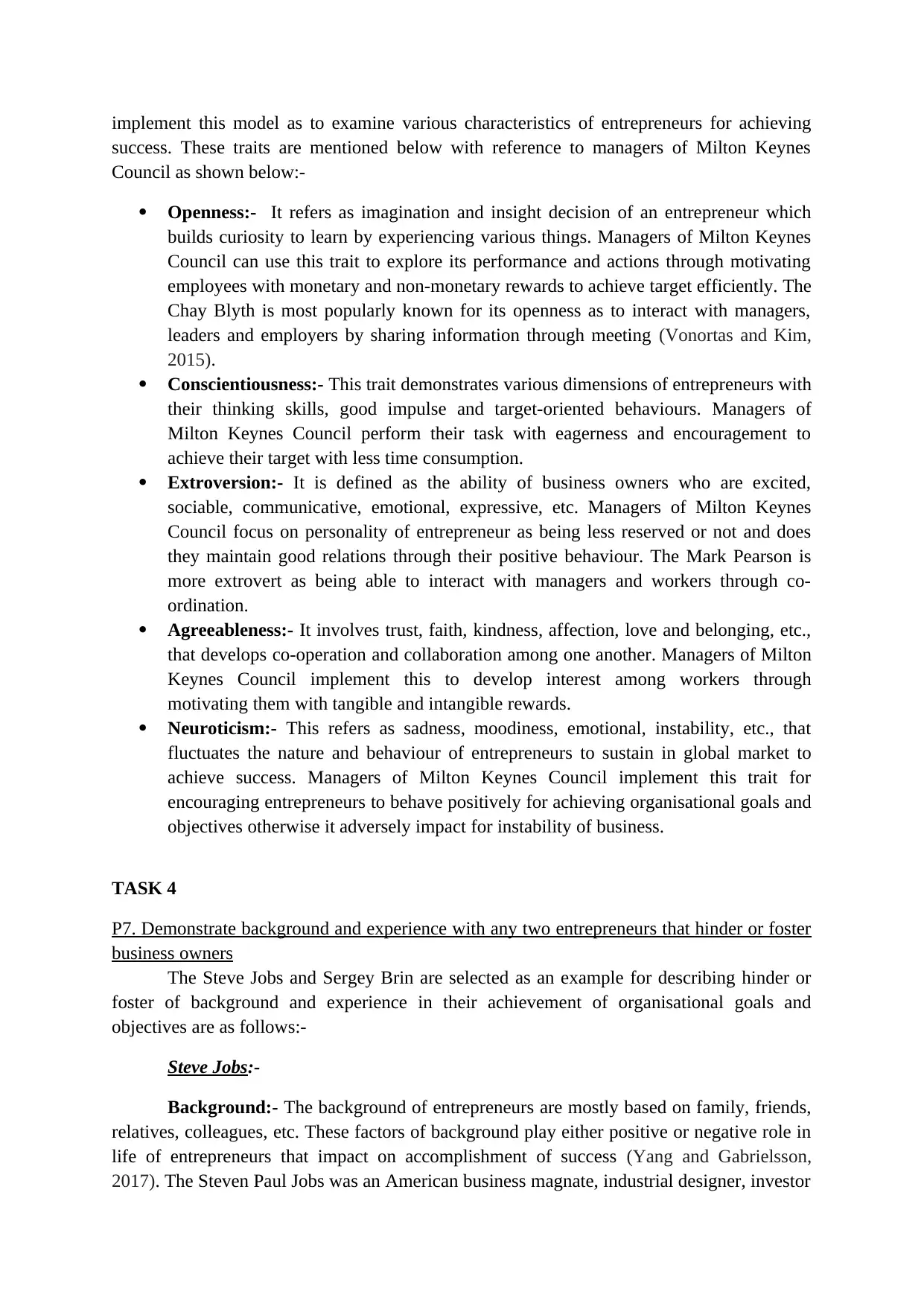
implement this model as to examine various characteristics of entrepreneurs for achieving
success. These traits are mentioned below with reference to managers of Milton Keynes
Council as shown below:-
Openness:- It refers as imagination and insight decision of an entrepreneur which
builds curiosity to learn by experiencing various things. Managers of Milton Keynes
Council can use this trait to explore its performance and actions through motivating
employees with monetary and non-monetary rewards to achieve target efficiently. The
Chay Blyth is most popularly known for its openness as to interact with managers,
leaders and employers by sharing information through meeting (Vonortas and Kim,
2015).
Conscientiousness:- This trait demonstrates various dimensions of entrepreneurs with
their thinking skills, good impulse and target-oriented behaviours. Managers of
Milton Keynes Council perform their task with eagerness and encouragement to
achieve their target with less time consumption.
Extroversion:- It is defined as the ability of business owners who are excited,
sociable, communicative, emotional, expressive, etc. Managers of Milton Keynes
Council focus on personality of entrepreneur as being less reserved or not and does
they maintain good relations through their positive behaviour. The Mark Pearson is
more extrovert as being able to interact with managers and workers through co-
ordination.
Agreeableness:- It involves trust, faith, kindness, affection, love and belonging, etc.,
that develops co-operation and collaboration among one another. Managers of Milton
Keynes Council implement this to develop interest among workers through
motivating them with tangible and intangible rewards.
Neuroticism:- This refers as sadness, moodiness, emotional, instability, etc., that
fluctuates the nature and behaviour of entrepreneurs to sustain in global market to
achieve success. Managers of Milton Keynes Council implement this trait for
encouraging entrepreneurs to behave positively for achieving organisational goals and
objectives otherwise it adversely impact for instability of business.
TASK 4
P7. Demonstrate background and experience with any two entrepreneurs that hinder or foster
business owners
The Steve Jobs and Sergey Brin are selected as an example for describing hinder or
foster of background and experience in their achievement of organisational goals and
objectives are as follows:-
Steve Jobs:-
Background:- The background of entrepreneurs are mostly based on family, friends,
relatives, colleagues, etc. These factors of background play either positive or negative role in
life of entrepreneurs that impact on accomplishment of success (Yang and Gabrielsson,
2017). The Steven Paul Jobs was an American business magnate, industrial designer, investor
success. These traits are mentioned below with reference to managers of Milton Keynes
Council as shown below:-
Openness:- It refers as imagination and insight decision of an entrepreneur which
builds curiosity to learn by experiencing various things. Managers of Milton Keynes
Council can use this trait to explore its performance and actions through motivating
employees with monetary and non-monetary rewards to achieve target efficiently. The
Chay Blyth is most popularly known for its openness as to interact with managers,
leaders and employers by sharing information through meeting (Vonortas and Kim,
2015).
Conscientiousness:- This trait demonstrates various dimensions of entrepreneurs with
their thinking skills, good impulse and target-oriented behaviours. Managers of
Milton Keynes Council perform their task with eagerness and encouragement to
achieve their target with less time consumption.
Extroversion:- It is defined as the ability of business owners who are excited,
sociable, communicative, emotional, expressive, etc. Managers of Milton Keynes
Council focus on personality of entrepreneur as being less reserved or not and does
they maintain good relations through their positive behaviour. The Mark Pearson is
more extrovert as being able to interact with managers and workers through co-
ordination.
Agreeableness:- It involves trust, faith, kindness, affection, love and belonging, etc.,
that develops co-operation and collaboration among one another. Managers of Milton
Keynes Council implement this to develop interest among workers through
motivating them with tangible and intangible rewards.
Neuroticism:- This refers as sadness, moodiness, emotional, instability, etc., that
fluctuates the nature and behaviour of entrepreneurs to sustain in global market to
achieve success. Managers of Milton Keynes Council implement this trait for
encouraging entrepreneurs to behave positively for achieving organisational goals and
objectives otherwise it adversely impact for instability of business.
TASK 4
P7. Demonstrate background and experience with any two entrepreneurs that hinder or foster
business owners
The Steve Jobs and Sergey Brin are selected as an example for describing hinder or
foster of background and experience in their achievement of organisational goals and
objectives are as follows:-
Steve Jobs:-
Background:- The background of entrepreneurs are mostly based on family, friends,
relatives, colleagues, etc. These factors of background play either positive or negative role in
life of entrepreneurs that impact on accomplishment of success (Yang and Gabrielsson,
2017). The Steven Paul Jobs was an American business magnate, industrial designer, investor
Paraphrase This Document
Need a fresh take? Get an instant paraphrase of this document with our AI Paraphraser
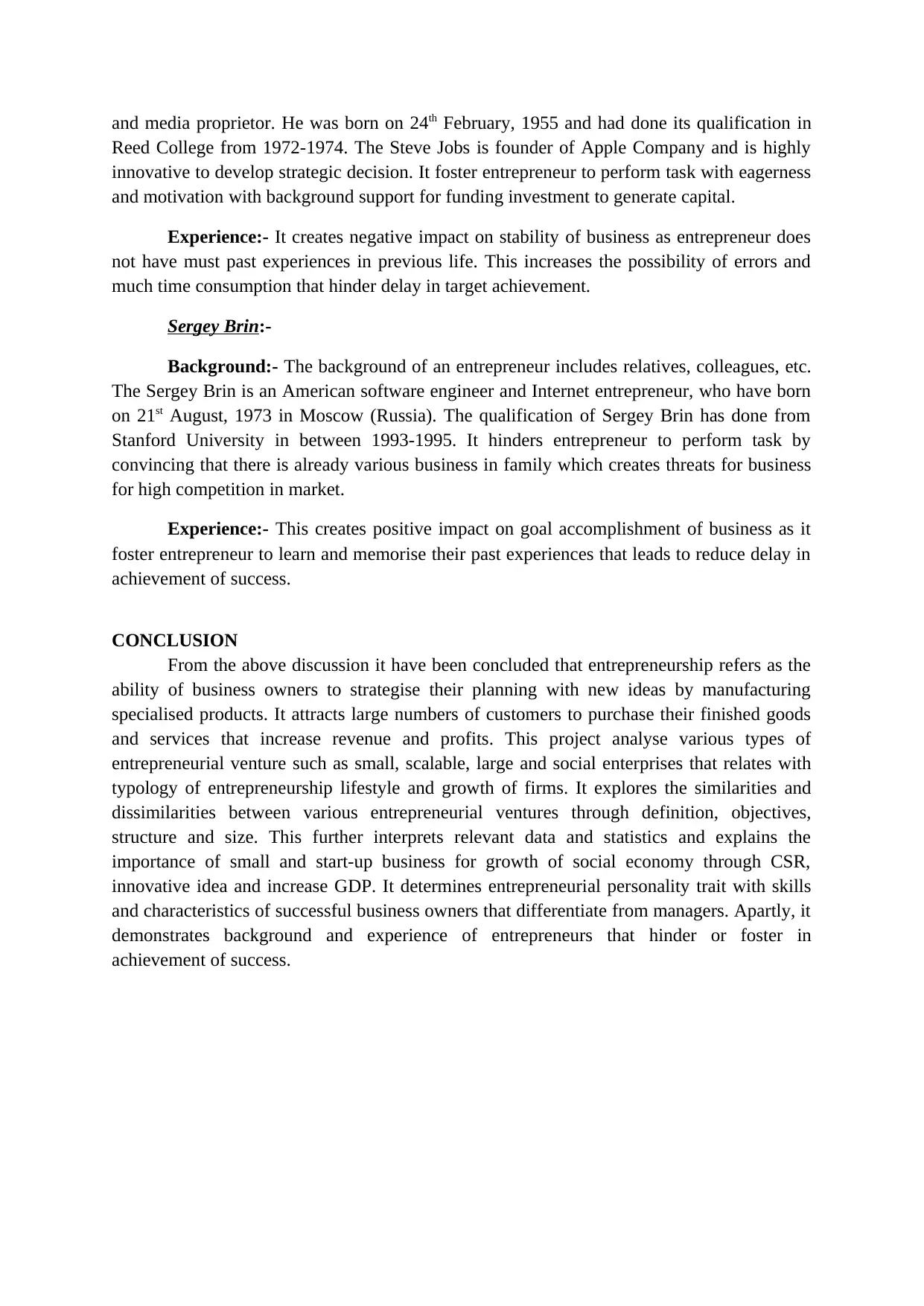
and media proprietor. He was born on 24th February, 1955 and had done its qualification in
Reed College from 1972-1974. The Steve Jobs is founder of Apple Company and is highly
innovative to develop strategic decision. It foster entrepreneur to perform task with eagerness
and motivation with background support for funding investment to generate capital.
Experience:- It creates negative impact on stability of business as entrepreneur does
not have must past experiences in previous life. This increases the possibility of errors and
much time consumption that hinder delay in target achievement.
Sergey Brin:-
Background:- The background of an entrepreneur includes relatives, colleagues, etc.
The Sergey Brin is an American software engineer and Internet entrepreneur, who have born
on 21st August, 1973 in Moscow (Russia). The qualification of Sergey Brin has done from
Stanford University in between 1993-1995. It hinders entrepreneur to perform task by
convincing that there is already various business in family which creates threats for business
for high competition in market.
Experience:- This creates positive impact on goal accomplishment of business as it
foster entrepreneur to learn and memorise their past experiences that leads to reduce delay in
achievement of success.
CONCLUSION
From the above discussion it have been concluded that entrepreneurship refers as the
ability of business owners to strategise their planning with new ideas by manufacturing
specialised products. It attracts large numbers of customers to purchase their finished goods
and services that increase revenue and profits. This project analyse various types of
entrepreneurial venture such as small, scalable, large and social enterprises that relates with
typology of entrepreneurship lifestyle and growth of firms. It explores the similarities and
dissimilarities between various entrepreneurial ventures through definition, objectives,
structure and size. This further interprets relevant data and statistics and explains the
importance of small and start-up business for growth of social economy through CSR,
innovative idea and increase GDP. It determines entrepreneurial personality trait with skills
and characteristics of successful business owners that differentiate from managers. Apartly, it
demonstrates background and experience of entrepreneurs that hinder or foster in
achievement of success.
Reed College from 1972-1974. The Steve Jobs is founder of Apple Company and is highly
innovative to develop strategic decision. It foster entrepreneur to perform task with eagerness
and motivation with background support for funding investment to generate capital.
Experience:- It creates negative impact on stability of business as entrepreneur does
not have must past experiences in previous life. This increases the possibility of errors and
much time consumption that hinder delay in target achievement.
Sergey Brin:-
Background:- The background of an entrepreneur includes relatives, colleagues, etc.
The Sergey Brin is an American software engineer and Internet entrepreneur, who have born
on 21st August, 1973 in Moscow (Russia). The qualification of Sergey Brin has done from
Stanford University in between 1993-1995. It hinders entrepreneur to perform task by
convincing that there is already various business in family which creates threats for business
for high competition in market.
Experience:- This creates positive impact on goal accomplishment of business as it
foster entrepreneur to learn and memorise their past experiences that leads to reduce delay in
achievement of success.
CONCLUSION
From the above discussion it have been concluded that entrepreneurship refers as the
ability of business owners to strategise their planning with new ideas by manufacturing
specialised products. It attracts large numbers of customers to purchase their finished goods
and services that increase revenue and profits. This project analyse various types of
entrepreneurial venture such as small, scalable, large and social enterprises that relates with
typology of entrepreneurship lifestyle and growth of firms. It explores the similarities and
dissimilarities between various entrepreneurial ventures through definition, objectives,
structure and size. This further interprets relevant data and statistics and explains the
importance of small and start-up business for growth of social economy through CSR,
innovative idea and increase GDP. It determines entrepreneurial personality trait with skills
and characteristics of successful business owners that differentiate from managers. Apartly, it
demonstrates background and experience of entrepreneurs that hinder or foster in
achievement of success.
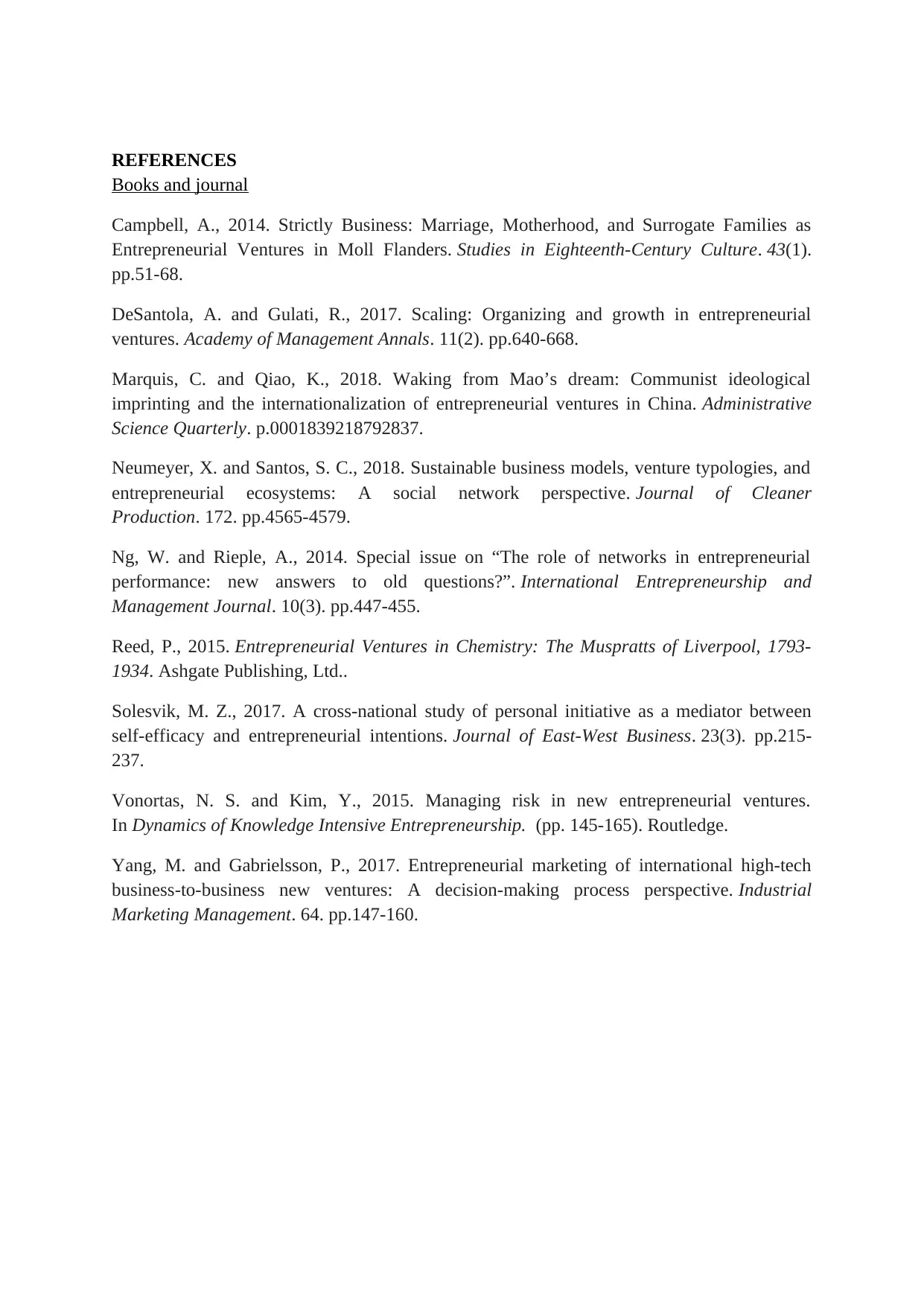
REFERENCES
Books and journal
Campbell, A., 2014. Strictly Business: Marriage, Motherhood, and Surrogate Families as
Entrepreneurial Ventures in Moll Flanders. Studies in Eighteenth-Century Culture. 43(1).
pp.51-68.
DeSantola, A. and Gulati, R., 2017. Scaling: Organizing and growth in entrepreneurial
ventures. Academy of Management Annals. 11(2). pp.640-668.
Marquis, C. and Qiao, K., 2018. Waking from Mao’s dream: Communist ideological
imprinting and the internationalization of entrepreneurial ventures in China. Administrative
Science Quarterly. p.0001839218792837.
Neumeyer, X. and Santos, S. C., 2018. Sustainable business models, venture typologies, and
entrepreneurial ecosystems: A social network perspective. Journal of Cleaner
Production. 172. pp.4565-4579.
Ng, W. and Rieple, A., 2014. Special issue on “The role of networks in entrepreneurial
performance: new answers to old questions?”. International Entrepreneurship and
Management Journal. 10(3). pp.447-455.
Reed, P., 2015. Entrepreneurial Ventures in Chemistry: The Muspratts of Liverpool, 1793-
1934. Ashgate Publishing, Ltd..
Solesvik, M. Z., 2017. A cross-national study of personal initiative as a mediator between
self-efficacy and entrepreneurial intentions. Journal of East-West Business. 23(3). pp.215-
237.
Vonortas, N. S. and Kim, Y., 2015. Managing risk in new entrepreneurial ventures.
In Dynamics of Knowledge Intensive Entrepreneurship. (pp. 145-165). Routledge.
Yang, M. and Gabrielsson, P., 2017. Entrepreneurial marketing of international high-tech
business-to-business new ventures: A decision-making process perspective. Industrial
Marketing Management. 64. pp.147-160.
Books and journal
Campbell, A., 2014. Strictly Business: Marriage, Motherhood, and Surrogate Families as
Entrepreneurial Ventures in Moll Flanders. Studies in Eighteenth-Century Culture. 43(1).
pp.51-68.
DeSantola, A. and Gulati, R., 2017. Scaling: Organizing and growth in entrepreneurial
ventures. Academy of Management Annals. 11(2). pp.640-668.
Marquis, C. and Qiao, K., 2018. Waking from Mao’s dream: Communist ideological
imprinting and the internationalization of entrepreneurial ventures in China. Administrative
Science Quarterly. p.0001839218792837.
Neumeyer, X. and Santos, S. C., 2018. Sustainable business models, venture typologies, and
entrepreneurial ecosystems: A social network perspective. Journal of Cleaner
Production. 172. pp.4565-4579.
Ng, W. and Rieple, A., 2014. Special issue on “The role of networks in entrepreneurial
performance: new answers to old questions?”. International Entrepreneurship and
Management Journal. 10(3). pp.447-455.
Reed, P., 2015. Entrepreneurial Ventures in Chemistry: The Muspratts of Liverpool, 1793-
1934. Ashgate Publishing, Ltd..
Solesvik, M. Z., 2017. A cross-national study of personal initiative as a mediator between
self-efficacy and entrepreneurial intentions. Journal of East-West Business. 23(3). pp.215-
237.
Vonortas, N. S. and Kim, Y., 2015. Managing risk in new entrepreneurial ventures.
In Dynamics of Knowledge Intensive Entrepreneurship. (pp. 145-165). Routledge.
Yang, M. and Gabrielsson, P., 2017. Entrepreneurial marketing of international high-tech
business-to-business new ventures: A decision-making process perspective. Industrial
Marketing Management. 64. pp.147-160.
1 out of 9
Related Documents
Your All-in-One AI-Powered Toolkit for Academic Success.
+13062052269
info@desklib.com
Available 24*7 on WhatsApp / Email
![[object Object]](/_next/static/media/star-bottom.7253800d.svg)
Unlock your academic potential
© 2024 | Zucol Services PVT LTD | All rights reserved.




